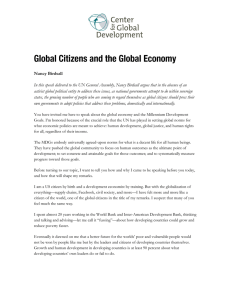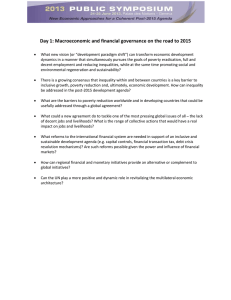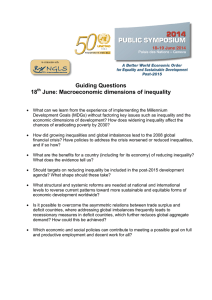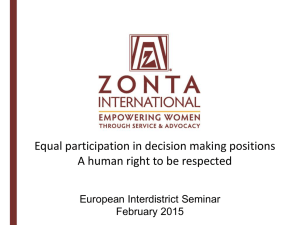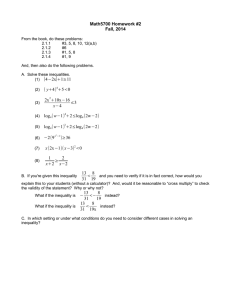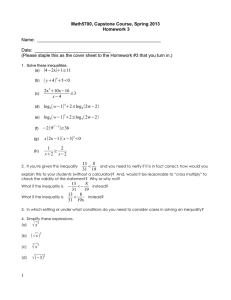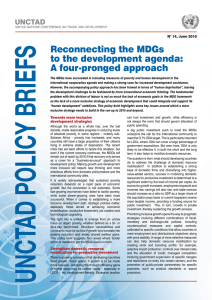center for global
advertisement
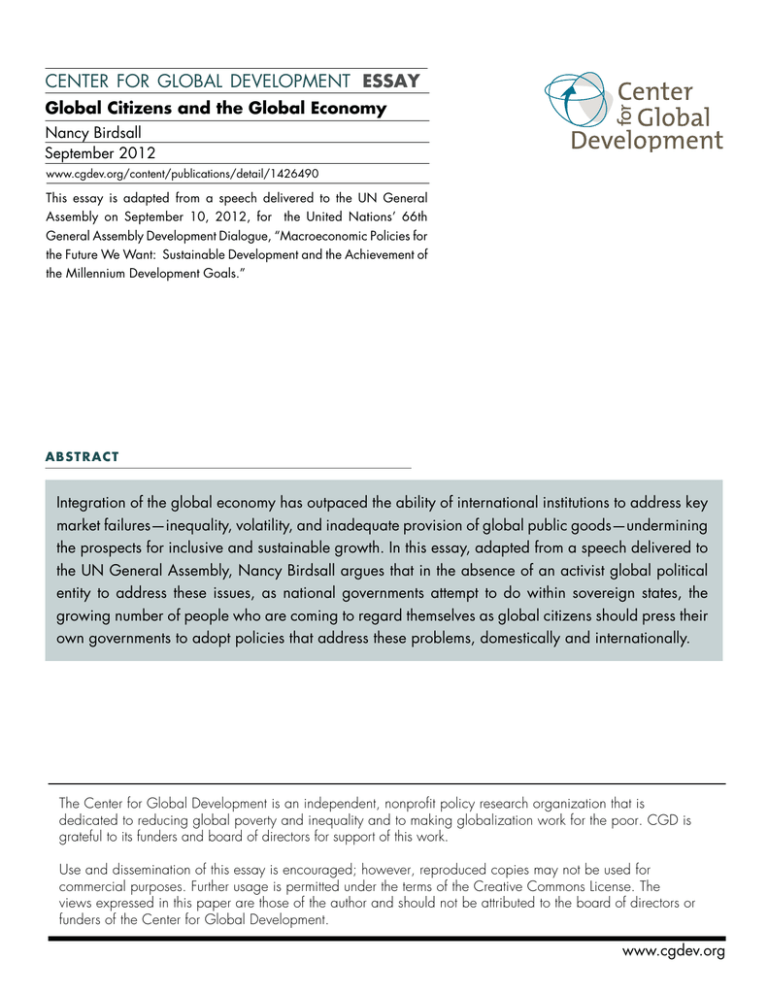
center for global development essay Global Citizens and the Global Economy Nancy Birdsall September 2012 www.cgdev.org/content/publications/detail/1426490 This essay is adapted from a speech delivered to the UN General Assembly on September 10, 2012, for the United Nations’ 66th General Assembly Development Dialogue, “Macroeconomic Policies for the Future We Want: Sustainable Development and the Achievement of the Millennium Development Goals.” abst r a c t Integration of the global economy has outpaced the ability of international institutions to address key market failures—inequality, volatility, and inadequate provision of global public goods—undermining the prospects for inclusive and sustainable growth. In this essay, adapted from a speech delivered to the UN General Assembly, Nancy Birdsall argues that in the absence of an activist global political entity to address these issues, as national governments attempt to do within sovereign states, the growing number of people who are coming to regard themselves as global citizens should press their own governments to adopt policies that address these problems, domestically and internationally. The Center for Global Development is an independent, nonprofit policy research organization that is dedicated to reducing global poverty and inequality and to making globalization work for the poor. CGD is grateful to its funders and board of directors for support of this work. Use and dissemination of this essay is encouraged; however, reproduced copies may not be used for commercial purposes. Further usage is permitted under the terms of the Creative Commons License. The views expressed in this paper are those of the author and should not be attributed to the board of directors or funders of the Center for Global Development. www.cgdev.org Contents Global citizens and the global economy ....................................................................................... 1 Slowing near-term growth............................................................................................................... 2 Shifting to inclusive and sustainable growth in a mostly unmanaged global economy ........................................................................................................... 5 Three problems: high inequality, volatility, and inadequate provision of public goods ........................................................................................................... 6 Global norms, global citizens, and the MDGs ............................................................................ 8 What can global citizens do? ...................................................................................................... 9 The role of the UN .................................................................................................................... 12 Global citizens and the global economy You have invited me here to speak about the global economy and the Millennium Development Goals. I’m honored because of the crucial role that the UN has played in setting global norms for what economic policies are meant to achieve: human development, global justice, and human rights for all, regardless of their income. The MDGs embody universally agreed-upon norms for what is a decent life for all human beings. They have pushed the global community to focus on human outcomes as the ultimate point of development; to set concrete and attainable goals for those outcomes; and to systematically measure progress toward those goals. Before turning to our topic, I want to tell you how and why I came to be speaking before you today, and how that will shape my remarks. I am a US citizen by birth and a development economist by training. But with the globalization of everything—supply chains, Facebook, civil society, and more—I have felt more and more like a citizen of the world, one of the global citizens in the title of my remarks. I suspect that many of you feel much the same way. I spent almost 20 years working in the World Bank and Inter-American Development Bank, thinking and talking and advising—let me call it “fussing”—about how developing countries could grow and reduce poverty faster. Eventually it dawned on me that a better future for the worlds’ poor and vulnerable people would not be won by people like me but by the leaders and citizens of developing countries themselves. Growth and human development in developing countries is at least 90 percent about what developing countries’ own leaders do or fail to do. Yet in a hyperconnected global system, what the world’s rich and powerful do or fail to do also matters. Rich and powerful outsiders can help, at least on the margin. They can also cause tremendous harm, sometimes through the unintended consequences of thoughtless actions, sometimes due to willful naïveté about the impact of their or inactions. So after 20 years of trying to nudge poor countries from the outside, I decided instead to fuss from the inside about the policies and practices of my own country and other rich and powerful players on the global stage. With good luck and great and generous support in late 2001, I became a cofounder of the Center for Global Development, a think-and-do tank devoted to holding up a mirror to the rich and powerful in the world— the US and European governments, the World Bank and the IMF, the WTO and the Financial Stability Forum, Davos men and women, no matter where they are from, and, yes, the United Nations itself. 1 In my remarks you will notice a recurring theme about accountability and responsibility. That includes not only the accountability and responsibility that the world’s rich and powerful countries have to the rest of the world, but also increasingly that of influential citizens everywhere—responsibility to do no harm to those more poor and vulnerable whether at home or abroad and to support their own countries’ economic policies and the international system in doing some good. Those of us here in this room are certainly, on a global basis, numbered among the world’s rich, powerful, and influential. I hope that many of you, like me, also see yourselves as global citizens. There are three parts to the remainder of my talk today. First, I will review the global growth outlook. Second, I will discuss the problems of an unmanaged global market economy and why I believe we are on the wrong growth track. Finally, I will suggest what the United Nations and we as global citizens can do to help address these problems. What is the responsibility of the world’s powerful and influential citizens to avoid harm and do good in a world in which sovereign nation-states are the primary political unit? Slowing near-term growth Our topic, “Macroeconomic policies for the future we want,” reflects how important the state of the world economy is to improving human welfare. Make no mistake: in recent decades, it is growth, and primarily market-driven growth, that has put the world on the winning side in the global war on poverty, creating opportunities for hundreds of millions of people to lift themselves out of poverty, and supporting rapid progress on the MDGs in many countries. In China, India, and more recently much of sub-Saharan Africa, rapid growth was supported by adherence to sensible macroeconomic policies as well as difficult market reforms encouraged by the IMF and the multilateral banks, but led within countries by political leaders. Until the 2007–08 financial crisis that started here in New York City, the boom in the rich world and high commodity prices contributed to that growth. More recently, since the crisis, it’s been the continuing growth in China, India, Brazil, and other emerging markets that has fueled that growth and lifted more people of poverty in those countries and in low-income countries. Though economic growth is not a goal in itself, it is a necessary means to achieve the Millennium Development Goals. Surely the 5 percent of growth or more in many African countries is a big part of the reason that last year child mortality in many parts of Africa fell by close to 5 percent, the rate of decline needed to meet Millennium Development Goal 4. 2 In short, high rates of growth in much of the developing world in the last decade have helped fuel progress overall on the MDGs and improve lives for more people around the world. And that growth has been secured in part by increased adherence to macroeconomic fundamentals, which in turn has made it possible to increase attention and spending on social programs that have also helped improve lives. However, as we approach 2015, the final target year for the MDGs, the global macro environment poses risks to the growth that has helped fuel progress on the MDGs. These are well known but worth reviewing because the discussion is often all about their impact on the rich world rather than their spillover effects on people in the developing world. Europe and the United States both face major challenges that are likely to keep them in a low-growth path for the foreseeable future. In Europe there is the small but real risk of the breakup of the currency union. In the United States, failure to agree on a sensible, balanced package of spending cuts and increased revenue for the medium term has resulted in the socalled fiscal cliff—mandatory draconian spending cuts on January 1 2013 if there is no agreement on an alternative. For the short term, political dysfunction is behind the lack of any fiscal investment in infrastructure or education as a means to re-ignite demand and job growth. The United States and Europe also face serious structural challenges, including high public debt and aging populations that rely on unsustainable pension entitlements. Add to these in the case of the United States a health system in which costs cannot be contained, an education system which is not delivering as it once did, and the apparent hollowing out of the middle class from the loss of manufacturing and other once high-wage jobs for midlevel skilled workers. The failure of the US political system to adequately address the short-run demand problem plus these medium-term challenges is sapping the confidence of consumers and investors, further impeding recovery. In both the United States and Europe, politics is at the heart of the economic challenges, and quick resolution seems unlikely. I expect that both Europe and the United States will more or less muddle through, that the worst-case scenarios will be avoided. Nonetheless, growth will be slower than through much of the 90s and the first decade of this century, weakening the kind of demand that for the last two decades has contributed to lifting millions out of poverty in Africa and Asia. Moreover, slow growth in the rich world does not bode well for readiness in those countries to address their failings on issues that matter for the world’s poor. The issue is not only or even mostly whether aid will decline; it seems clear that the past decade of growing official aid budgets may be over. More problematic are nonaid policies that matter as much or more for the world’s poor: access to rich-country markets for job-intensive agricultural and manufactured goods, more open immigration policies, and a willingness to tackle 3 aggressively such global pathologies as drug and sex trafficking and dangerous carbon emissions. History suggests that in times of slow growth, politics in the rich world turns inward, not outward. That makes progress increasingly dependent on healthy growth in the big emerging markets of China, India, and Brazil—especially China. Although these and other emerging-market economies are growing faster than the rich countries, they are not big enough make up for weak demand in the United States and Europe. The rising emerging markets as a group constituted about 30 percent of global (PPP) income in 2010, compared to about 55 percent for high-income countries. Brazil, China, and India together imported goods and services worth about $2.3 trillion, a little more than 10 percent of global imports; but the European Union and the United States together imported twice as much. And now the economies of Brazil, China, and India are slowing. They are, to use the economists’ expression, still coupled in growth terms to the advanced economies. Thus global growth is as interdependent as ever, putting a high premium on the macroeconomic coordination and other forms of cooperation among all the big economies—rich and emerging— that happened in 2009 in response to the financial panic but has badly stalled since then. What does this mean for MDG progress in the next years? First, an immediate crisis—in the Eurozone or as the United States confronts its self-imposed fiscal mess at the end of this calendar year—would do tremendous harm. Developing countries weathered the 2008–09 crisis well—a credit to the resilience many had preserved or built in their banking and other financial systems. But the crisis imposed tremendous costs on the majority of their people nonetheless, through its effects on the real economy as trade and remittances collapsed in 2009. Many children who left school did not return, and more mothers and children died preventable deaths because health spending fell temporarily across the developing world. Setting aside the small but disastrously costly risk of a meltdown in Europe or the United States, the issue is the effects within developing countries of slower growth overall in an interdependent global economy. The IMF has recently reduced its global growth projection for 2013 to 3.7 percent (from 4.1 percent earlier this year), compared with 4.2 percent between 2002 and 2008. This year and next year, the rich countries are projected to grow at an average of just 1.7 percent, the big emerging markets at an average of 5 percent, and all emerging and developing economies taken together at a little less than 6 percent. In the middle-income countries, where hundreds of millions of people still live in poverty, there is less fiscal space than there was five years ago to cope with adverse conditions. Macroeconomic management to sustain poverty-reducing growth without inflation will be increasingly demanding. In many low-income countries, it may not be possible to depend on continuing growth of the kind of external demand, particularly for commodities, that supported many countries’ economic expansion in the last 10 years. Adding to the difficulty, whether due to a sudden crisis or a prolonged period of low growth, is that the IMF and the 4 World Bank are less fortified financially than they were in 2009. The IMF cannot save Europe and the rest of the world were that a sudden necessity; and the World Bank, even with a recent recapitalization, would be hard put to respond as it did in 2009 and 2010. The bottom line for the MDGs: The external environment will be less propitious. In the absence of a crisis, continued progress toward the MDGs is certainly possible. But progress in the low- and middle-income countries will depend more than ever on domestic economic policies that support job-friendly and poverty-reducing growth. In the case of the maternal mortality rate, the most “stubborn” of the goals for which success seems to depend on new and possibly costly interventions, it is especially hard to be optimistic. For the small group of countries where achievement of the MDGs is most at risk, it is not only increased effort and spending that matters, but the end of conflict and, in some countries, the changes in politics and leadership that could bring better management of social services and better governance overall. Shifting to inclusive and sustainable growth in a mostly unmanaged global economy This brings me to the second key idea of my talk: the problems of an inadequately managed global economy and why I believe we are on the wrong growth track. The UN has been a champion for the ideas of inclusive and sustainable growth. Yet the growth we have experienced in recent decades has not been sufficiently inclusive and it is certainly not sustainable. What do I mean by inclusive? In a global community, it must mean growth that benefits the huge majority of citizens of the world who live on $5 per day or less. And in my view it should refer not only to better material outcomes for the poor and vulnerable but to equal opportunity. It is fundamentally about a system of government and processes and protections that are more fair and just. Sustainable means not living beyond our means, robbing our children and grandchildren of better lives and imperiling the natural systems—the air, water, soils, and especially climate— upon which we and all other life on the planet depend. In my view, it should include not only maintaining natural systems adequate to support our economic well-being, but also ensuring that future generations have an opportunity to experience a sense of harmony with the natural world. None of this will be possible unless we can make a rapid transition to a global energy supply not based on burning fossil fuels and emitting carbon. On these two counts it is hard to be optimistic. We know what the policy solutions are— there is a reasonably clear and strong consensus within the economics profession on what policies would lead to more fair and inclusive growth, and a more sustainable, carbon-free growth path. 5 But the challenge is less about economics and more about politics. The politics of getting to “inclusive and sustainable” are particularly difficult with slower growth almost everywhere in the world. For example, growth in the United States has been failing even a modest standard of inclusiveness for almost two decades. In the last decade, it has been highly concentrated, benefiting the richest 10 percent of households, particularly those in banking and other financial services, and failing to reach everyone else. This highly concentrated growth does not fuel the increased consumer demand necessary for job creation and inclusive growth; it creates instead a vicious cycle. Political contributions and pressures have reinforced this trend, undermining support for public investments in infrastructure that would create jobs in the short run and in education and innovation that would raise worker productivity and income in the long run. In China, growth has created millions of higher-productivity jobs but has also brought high urban pollution and unsustainable use of natural resources. With high coal reserves and hundreds of millions of people lacking access to electricity, it is not politically easy to move to a low-carbon growth path. Indeed what is impressive is the commitment China and also India are making to increasing the use of renewable energy despite those pressures. Whether they can maintain that commitment as growth slows, we will see. Three problems: high inequality, volatility, and inadequate provision of public goods The above examples illustrate the challenge. Though private markets have been the engine of growth in the developing world in the last two decades, they are not perfect. Because of market imperfections, they need to be managed—that is the role of the state in domestic markets. But in global markets, we do not have the “state.” Economic globalization has outpaced political globalization. We have a global economy without the equivalent at the global level of a state. That makes it difficult to deal with what economists call market failures—for which it sometimes makes sense for the state to intervene. Three resulting problems have contributed to and are symptoms of our difficulty in getting onto a growth path that is inclusive and sustainable: continuing high inequality, volatility, and inadequate provision of public goods. I’ll review each briefly and then turn to the final part of my remarks: what we can do about it. First, inequality. Unmanaged or unfettered markets tend to lock in preexisting income and wealth inequality or generate, along with growth, increasing inequality. For individuals, the right asset in today’s global economy is higher education. Although the supply of higher-education graduates has been increasing around the world, and especially in 6 developing countries, the demand for their skills has increased even faster, fueled by technological change and the nearly instant global diffusion of new technologies. For countries, the key asset is stable and sound government institutions committed to the rule of law, property rights, and human rights. We entered the 1990s with preexisting inequalities within and across countries. Within most developing countries, income inequality has risen with growth. This is dramatically so in China, where because citizen’s associate it with corruption, it is putting tremendous strain on social and political stability; it is also true, though less dramatically, in India. Only in Brazil and other countries of Latin America is there evidence that inequality has finally begun to fall—though from such extraordinarily high levels that it is still a blight. Looking across countries, China, Brazil, and other middle-income countries are converging slowly toward rich-country average income. But the gap in average income between the world’s richest and poorest countries is, depending on the measure you use, at least 20 to 1, and between the richest country in Europe and the poorest in sub-Saharan Africa, more than 100 to 1. If we line up all households in the world according to household income per capita, the resulting truly global inequality is even more shocking: the income of the world’s richest 1 percent of households is equivalent to the income of the world’s poorest 60 percent. Global markets alone are unlikely to reduce inequality enough and soon enough to satisfy even modest standards of justice in what is now a global system of interactions across as well as within countries. Indeed, the MDGs themselves reflect the kind of global resolve that those interactions have triggered. Second, financial and other volatility. In 2007 and 2008, we saw how the tightening of fuel and food markets led to price spikes that were particularly painful for importing countries that had relied on global trade of these products—and for poor households in those countries. Then at the end of 2008 came the collapse of financial markets around the world, with real effects on growth, jobs, and well-being everywhere, though thankfully they were not long-lasting in many developing countries. Moreover financial-market panics are often complicit in contributing to income inequality. The high public debt that follows government rescues of banks and other financial institutions crowds out private investment and job creation and reduces the fiscal space for spending on infrastructure, education, and health programs that benefit the poor and help build a middle class. That was a problem in Latin America in the 1980s and again at the turn of this century, and it is a problem now and for the future in Greece, Ireland, Spain, and other victims of the housing boom and consequent financial bust. Third, inadequate public goods, especially global public goods. This is perhaps the most serious and difficult challenge facing the global community today. Economists define public goods as those products and services on which market actors cannot make a profit (or fully capture the benefits) were they to invest or spend. 7 Basic education is publicly financed almost everywhere in the world because basic education is a quasi‐public good—parents (and their children) capture some of the benefits of going to school, but not all of the benefits that societies reap when more people are educated. By the same logic, most governments spend public resources to prevent contagious diseases. The classic case of a public good is control of pollution: the factory owner who implements pollution controls pays the costs but captures only a small part of the benefits to his community. At the global level, the urgent analogy is greenhouse gas emissions: countries that reduce emissions cannot capture all the benefits for themselves. Just as local pollution control requires that a government entity impose regulations or create offsetting incentives through taxes or subsidies, global‐level control of greenhouse gas emissions is likely to require that an activist international community (including at the least the major polluter countries) impose controls or agree on incentives. Climate change is the biggest and most glaring example of a global problem that hits the poor people and countries hardest. By an unfortunate twist of fate, tropical countries that contributed least to the accumulation of gases are likely to suffer the worst declines in agricultural productivity, in precisely the sector within countries where the poor are heavily concentrated. In the absence of corrective action at the global level, projected declines in agriculture in India are on the order of 30 percent in the next 70 years. In parts of Africa it is as bad or worse. Sea-level rise in Bangladesh, drought and floods, and the expanding reach of malaria and other diseases in many tropical areas will also hit the most vulnerable hardest. Other global public goods that the market naturally neglects include agricultural research and development likely to benefit people and places with low incomes and limited market power, and health research and development on malaria and other diseases that primarily afflict the poor. These are areas where in the last several decades large philanthropies like the Gates Foundation have stepped in to compensate for chronic underfunding by rich‐country “donor” governments. Global norms, global citizens, and the MDGs This brings me to the third and final part of my talk: what we can do and the role of the United Nations—including as reflected in the Millennium Development Goals. During the second half of the 20th century the United States provided sensible leadership in creating the institutions that set the framework for market-driven growth: the UN to foster peace and security and human rights; the GATT and then WTO to encourage trade; the IMF 8 and World Bank to promote economic and financial stability and help finance investmentled growth. But the age of the United States as benign hegemon is over. It is still a superpower—there is no doubt about that. But its economic model of minimally managed markets fell from its pedestal in 2008, and its loss in relative terms of economic superiority has taken a toll in geopolitical terms. The United States can no longer take for granted that its lead will be followed. Meanwhile Europe is distracted, and the BRICs—Brazil, Russia, India, China, South Africa and other rising emerging markets—are not ready or able as a group to take the reins of global collective action on our common challenges. We need a new politics at the international level that addresses these three problems of badly managed markets—high and rising inequality, volatility, and inadequate public goods—not only within countries but at the global level. Getting to agreement on a new path is difficult enough at the domestic level in the midst of slow growth—that is part of the problem today in Europe and the United States. We have seen in the past few years in dramatic fashion how the US model fails to address these problems; even Europe, which many expected to have a better handle on these issues, has come up short. The international or global politics of addressing these collective-action problems is even tougher. The first-best solution would be in principle be an activist global polity, one with the mandate from global citizens to set and enforce policies and practices that would reduce global inequality, deal with volatility, and ensure adequate provision of such global public goods as zero-carbon-emissions energy. But in fact the world is made up of sovereign nations—and it is within sovereign nations that democratic and representative systems of government are rooted. It is within nations that citizens of the world—the global citizens in the title of these remarks—have the possibility and the responsibility to hold the governments of their own countries accountable for policies and practices that have impacts within and beyond their borders. I do believe our global economy is producing more and more people who feel as I do to be in part global citizens. The huge increase in individual giving across borders, in response to poverty and natural disasters, along with student travel, diaspora movements, and the rise of international NGOs, all herald that new kind of citizenship. It is bound to grow in this century, and that is a good thing. What can global citizens do? What, then, is the role of these newly global citizens in promoting policies for more inclusive and sustainable growth? Global citizens are best placed to make a difference within their own countries, by holding their own governments accountable for policies and practices that 9 matter for the world’s poor. Let me suggest a few examples of changes in the policies of rich-country governments that are in the interests of the poor everywhere and therefore ought to be on the agenda of global citizens: In the United States, a price on carbon and other greenhouse gas emissions. The United States remains the world’s largest emitter of heat-trapping gases in absolute terms and among the very highest in per capita terms. Its failure to act has stalled progress on a global climate agreement, imposing even now high costs on the world’s most vulnerable people that have the least ability to cope. Europe has at least put a price on carbon, though it is not yet high enough. In western Europe, support for leading instead of resisting reform of governance at the IMF. German and French citizens should support their countries’ yielding of Europe’s problematic grip on the leadership of the IMF. In the small countries that have championed more and better aid, citizens should support the logic for Europe and the world of a single unified EU chair on the board, opening up chairs for African nations and other developing regions that are now poorly represented. The excellent performance of Christine Lagarde notwithstanding, continued US and European domination of the board and leadership selection process is discouraging engagement and financial support on the part of the rising Asian and other emerging-market countries. That is reducing the potential financial heft of that institution when an increasingly interdependent global system needs a bigger and stronger IMF to deal with the next financial crisis. The same governance problems are undermining the long-run potential of the World Bank. In the United States, support for analogous changes in governance at the World Bank as well. The United States will never put at risk its ability to block a candidate for president of the World Bank it does not want. But American opinion leaders and legislators should support rather than resist a change in selection procedures for the next president that would prevent a kind of tyranny of the rich majority that now prevails. That would strengthen multilateralism in general—which in the long run is the best strategy for securing the legitimate interests of Americans in a multipolar global system. In all the advanced economies, support for a World Bank mandate to address challenges that loans alone cannot; duty-free, quote-free market access for the least developed countries; and greater support for antibribery and anticorruption efforts. 10 An initiative for additional World Bank capital in support of a beyond-lending mandate on development challenges would help the bank address agricultural research, water, climate, drug resistance, and other cross-border problems. Providing duty-free, quota-free market access for the least developed countries would help lift many out of poverty and is an unmet commitment of the neglected MDG # 8. Global antibribery and anticorruption efforts require active support from all advance economies for greater sharing across governments of tax information, enforcement of antibribery and other conventions to reduce the corruption in poor countries, support for police and other efforts to recover assets stolen by former leaders in the developing world. They also require support at the United Nations for a new initiative to put teeth in the Global Compact under which international businesses commit to behavior consistent with the goals of inclusion and sustainability. In all countries, support for more humane and sensible approach to international migration. Such an approach would recognize the inherent illogic of having an open market for goods and capital but a closed market for people—and the huge potential of allowing increased movement of people to reduce inequality in both sending and receiving countries. As these examples show, the issues for which global citizens should press their governments to do the right thing and hold them accountable extend far beyond foreign aid and philanthropy to changes in trade and migration policies more friendly to development and growth, cooperation in halting the outflow of stolen assets from developing countries, and enforcement of legislation to prevent abuse of natural resources by international extractive industries in poor countries. The role of global citizens in pushing their own governments to help foster the future we want is not limited to the high income countries. In Brazil and Indonesia, the rich and powerful should be supporting their own active civil society organizations fighting to protect their forests—a global as well as national resource. In China and India, rich and powerful citizens should encourage the huge public investments in infrastructure and social services that will move grow their economies and reduce their own continuing large numbers of poor. The rich and powerful in middle-income countries can push for the progressive tax and expenditure policies that will put their countries on a more inclusive growth 11 path. They should be the champions of public investment in renewable energy in the interests of their own poor countrymen and women. Global citizens can act in other ways. The history of the last 60 years is replete with mixed coalitions of citizen-based civil society, business groups, and governments bringing real change—eliminating landmines, fighting the AIDS pandemic, and creating environmental movements in support of biodiversity. It is global citizens who started the microfinance movement, are fighting to find new ways to finance rapid social and economic progress in poor countries via a currency transactions tax, and are creating internet-based programs for direct citizen-to-citizen giving after natural disasters. The role of the UN I’d like to close by returning to the role of the UN as, among other things, the home of the Millennium Development Goals. The UN is made up of member countries. In fostering global prosperity, it has neither the financial clout of the major international economic institutions nor the political role it plays on security issues. But it is powerful in another sense. It has the legitimacy and the convening power to set norms. Its moral suasion and support are critical in encouraging global citizens in their efforts to make their own country governments fully accountable for domestic and international policies consistent with inclusive and sustainable growth. It can do that in its own programs and actions by being itself a model of transparency and accountability, to its member countries and directly to global citizens everywhere. Indeed, much of the power of the MDGs—with the unfortunate exception of the neglected MDG 8 on rich-country actions—has been realized through the emphasis on transparency and systematic measurement in the interests of accountability that the UN has fostered in its MDG campaigns. The ideas of transparency and accountability can be further accentuated in whatever set of principles, goals, or standards succeed the MDGs after 2015. The UN also can embody the global values and set the moral standards that inspire the larger movements and coalitions that can make such a difference in the lives of their fellow global citizens. Those of us in this room are among the world’s rich, influential, and powerful. We are each responsible for holding our own countries accountable—for domestic policies that at the least do no harm elsewhere, and for our own countries’ support of multilateralism and international cooperation on global economic and financial challenges. I do believe that more citizens of the world, particularly young citizens, are getting on board. Let us all join them. 12
